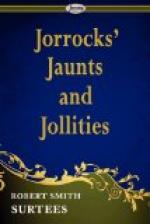The streets were werry full, but Sir Wincent wormed his way among the coal-wagons, wans, busses, coaches, bottom-over-tops,—in wulgar French, “cow sur tate,” as they calls the new patent busses—trucks, cabs, &c., in a marvellous workmanlike manner, which seemed the more masterly, inasmuch as the leaders, having their heads at liberty, poked them about in all directions, all a mode Francey, just as they do in Paris. At the Marsh gate we were stopped. A black job was going through on one side, and a haw-buck had drawn a great yellow one ’oss Gravesend cruelty wan into the other, and was fumbling for his coin.
“Now, Young Omnibus!” cried Sir Wincent, “don’t be standing there all day.” The man cut into his nag, but the brute was about beat. “There, don’t ’it him so ’ard (hard),” said Sir Wincent, “or you may hurt him!”
When we got near the Helephant and Castle, Timothy Odgkinson, of Brixton Hill, a low, underselling grocer, got his measly errand cart, with his name and address in great staring white letters, just in advance of the leaders, and kept dodging across the road to get the sound ground, for the whole line was werry “woolley” as you calls it. “Come, Mister independent grocer! go faster if you can,” cries Sir Wincent, “though I think you have bought your horse where you buy your tea, for he’s werry sloe.” A little bit farther on a chap was shoving away at a truck full of market-baskets. “Now, Slavey,” said he, “keep out of my way!” At the Helephant and Castle, and, indeed, wherever he stopped, there were lots of gapers assembled to see the Baronet coachman, but Sir Wincent never minded them, but bustled about with his way-bill, and shoved in his parcels, fish-baskets, and oyster-barrels like a good ’un. We pulled up to grub at the Feathers at Merstham,




